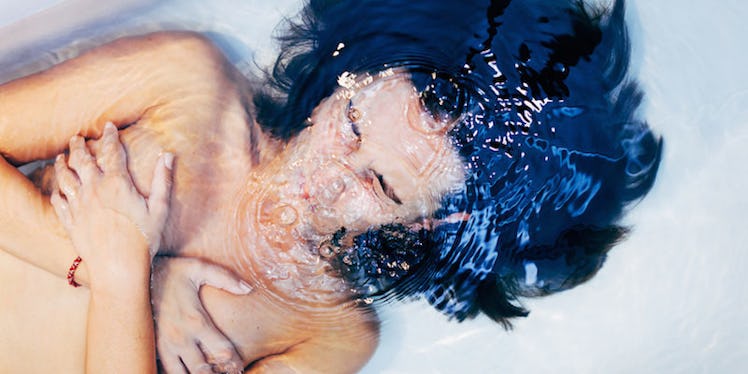Are you feeling fat, or do you hate your nose? We live in a society where outbursts of negative self-talk are an accepted reality.
Humans have insecurities, and in turn, we are used to hearing our peers chide themselves and others. However, when should negative self-talk be treated as something more than typical insecurities?
When I checked into an eating disorder facility two years ago, I was diagnosed with severe body dysmorphic disorder (BDD) of my chin and thighs.
“Isn’t that just another way of saying I’m self-absorbed?” I whined to my therapist. Growing up, hearing peers say they “felt fat” was as common a saying as “TTYL,” so I assumed being unhappy with your appearance was something everybody struggled with.
"Modern Family" actor Reid Ewing made headlines recently when he cast awareness on BDD. He wrote about the daily plights of someone who struggles with the serious and often unrecognized psychological disorder characterized by a perceived defect in appearance. While every case is specific, here are five signs you may have body dysmorphic disorder:
1. You never feel fully engaged.
You have a complete loss of interest and presence. You will talk to people and be unable to concentrate on what they say because you wonder whether they have looked down and seen how “disgusting” your hands are. You will hike with your family and spend over an hour of the two hour hike obsessing about how big your thighs looked in a picture taken back at the cabin.
You will promise a friend you’ll go to dinner and then flake because you cannot mentally spend another moment looking at your thighs in your pants. You cannot bear to sit for two more hours with the discomfort, so you cancel to go home. You put on baggy sweatpants and an oversized T-shirt, and you hide them under a blanket so you don’t have to look at yourself.
2. You have an abusive relationship with mirrors.
Every mirror either induces panic or worsens it. On a subway, you will stare in the reflection of the window, and you will obsess over whether they look different from how they did in your bathroom mirror, bedroom mirror, the reflection of your kitchen oven, the reflection of your neighbors window and the reflection of a shop window.
As a 7-year-old, I used to sit in front of my bathroom mirror and yank my ears back while I attempted to duct tape them to my head. As a 23-year-old, I would observe my thighs and the acne on my chin in every available reflection I could.
“She sure has never seen a mirror she doesn’t like,” my family joked, but what they didn’t understand is that I lived in constant fear that my chin had produced more acne in this mirror than the one I last looked into, or that my most recent meal had expanded my thighs.
3. You develop negative coping mechanisms.
Whether it's eating disorders, shopping addictions, substance abuse or plastic surgery overload, you will likely develop negative coping mechanisms to manage the thoughts that plague you when you suffer with BDD.
Whether it's that you run 13 miles a day to try to change your thighs or obsessively online shop and buy 10 different concealers to hide the “grotesque” acne on your chin, undiagnosed BDD plagues your thoughts so that you “have” to change something immediately.
You cannot sit with the discomfort of your “crooked” nose or “multiplying” wrinkles. You have to do something to make it “better,” even if means drinking a bottle of merlot every night to ease the anxiety.
4. You will compare yourself to every single person around you.
You will be in an office meeting and fixate on all your co-workers thighs, fantasizing over how different you would look if you had theirs instead of your own. You will try to bring a sweater to a meeting to lay over your lap so you can attempt to focus better on your job.
You will be standing in line in the grocery store and notice someone has a pimple on their chin, and you will glance at it over and over again to compare it with the ones you are sure enveloping your face. No matter who you compare yourself to, you will always lose.
5. A negative voice becomes a mosquito in your ear.
It's a buzz from the moment you wake up to the moment you go to sleep. You will walk down the street and see someone walk toward you, only to panic that you both won’t be able to fit on the same sidewalk. You will step onto the bus and look immediately to see if seats in the front are open because you worry your thighs will knock against other people if you have to go down the aisle.
You will choose not to sit on a subway between two people because you’re scared you won’t fit. You will stop showering regularly because you know if you do, you will only end up playing with the fat on your thighs to determine how much of it you could cut off to feel better.
You will have restless sleep and wake up in a panic from a BDD dream in the middle of the night to feel whatever body part is plaguing you. You will stand up at a table and follow your friends eyes to make sure they aren’t looking down at your thighs when you stood.
BDD will consume you. It might start slowly, and then it will happen all at once. It can take on many different shapes, forms and body parts, and it will strip your life from you without you even realizing.
The more candid those of us in recovery become, the more we can help others empathize with what we're going through. Perhaps then, we will have a better means of fighting it within ourselves and as a community.
